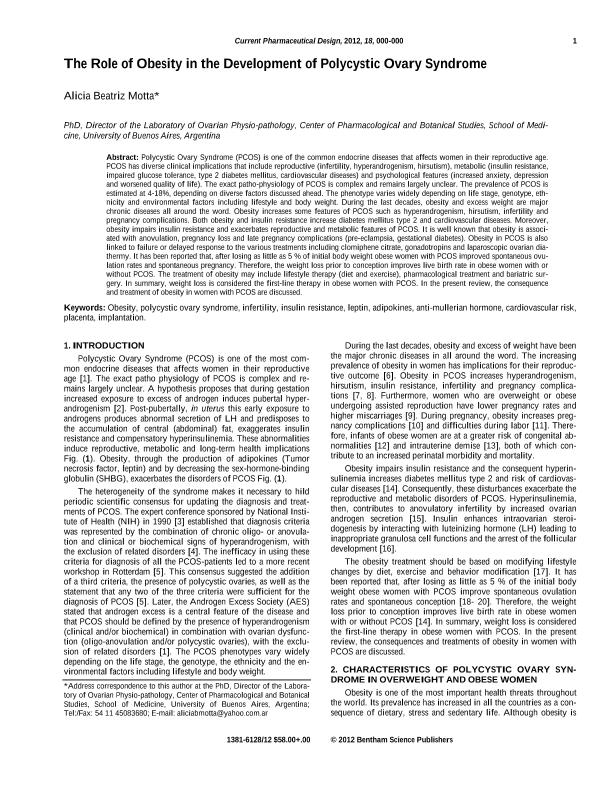Artículo
The role of obesity in the development of polycystic ovary syndrome
Fecha de publicación:
06/2012
Editorial:
Bentham Science Publishers
Revista:
Current Pharmaceutical Design.
ISSN:
1381-6128
Idioma:
Inglés
Tipo de recurso:
Artículo publicado
Clasificación temática:
Resumen
Polycystic Ovary Syndrome (PCOS) is one of the common endocrine diseases that affects women in their reproductive age. PCOS has diverse clinical implications that include reproductive (infertility, hyperandrogenism, hirsutism), metabolic (insulin resistance, impaired glucose tolerance, type 2 diabetes mellitus, cardiovascular diseases) and psychological features (increased anxiety, depression and worsened quality of life). The exact patho-physiology of PCOS is complex and remains largely unclear. The prevalence of PCOS is estimated at 4-18%, depending on diverse factors discussed ahead. The phenotype varies widely depending on life stage, genotype, ethnicity and environmental factors including lifestyle and body weight. During the last decades, obesity and excess weight are major chronic diseases all around the word. Obesity increases some features of PCOS such as hyperandrogenism, hirsutism, infertility and pregnancy complications. Both obesity and insulin resistance increase diabetes mellitus type 2 and cardiovascular diseases. Moreover, obesity impairs insulin resistance and exacerbates reproductive and metabolic features of PCOS. It is well known that obesity is associated with anovulation, pregnancy loss and late pregnancy complications (pre-eclampsia, gestational diabetes). Obesity in PCOS is also linked to failure or delayed response to the various treatments including clomiphene citrate, gonadotropins and laparoscopic ovarian diathermy. It has been reported that, after losing as little as 5 % of initial body weight obese women with PCOS improved spontaneous ovulation rates and spontaneous pregnancy. Therefore, the weight loss prior to conception improves live birth rate in obese women with or without PCOS. The treatment of obesity may include lifestyle therapy (diet and exercise), pharmacological treatment and bariatric surgery. In summary, weight loss is considered the first-line therapy in obese women with PCOS. In the present review, the consequence and treatment of obesity in women with PCOS are discussed.
Archivos asociados
Licencia
Identificadores
Colecciones
Articulos(CEFYBO)
Articulos de CENTRO DE ESTUDIOS FARMACOLOGICOS Y BOTANICOS
Articulos de CENTRO DE ESTUDIOS FARMACOLOGICOS Y BOTANICOS
Citación
Motta, Alicia Beatriz; The role of obesity in the development of polycystic ovary syndrome; Bentham Science Publishers; Current Pharmaceutical Design.; 18; 17; 6-2012; 2482-2491
Compartir




